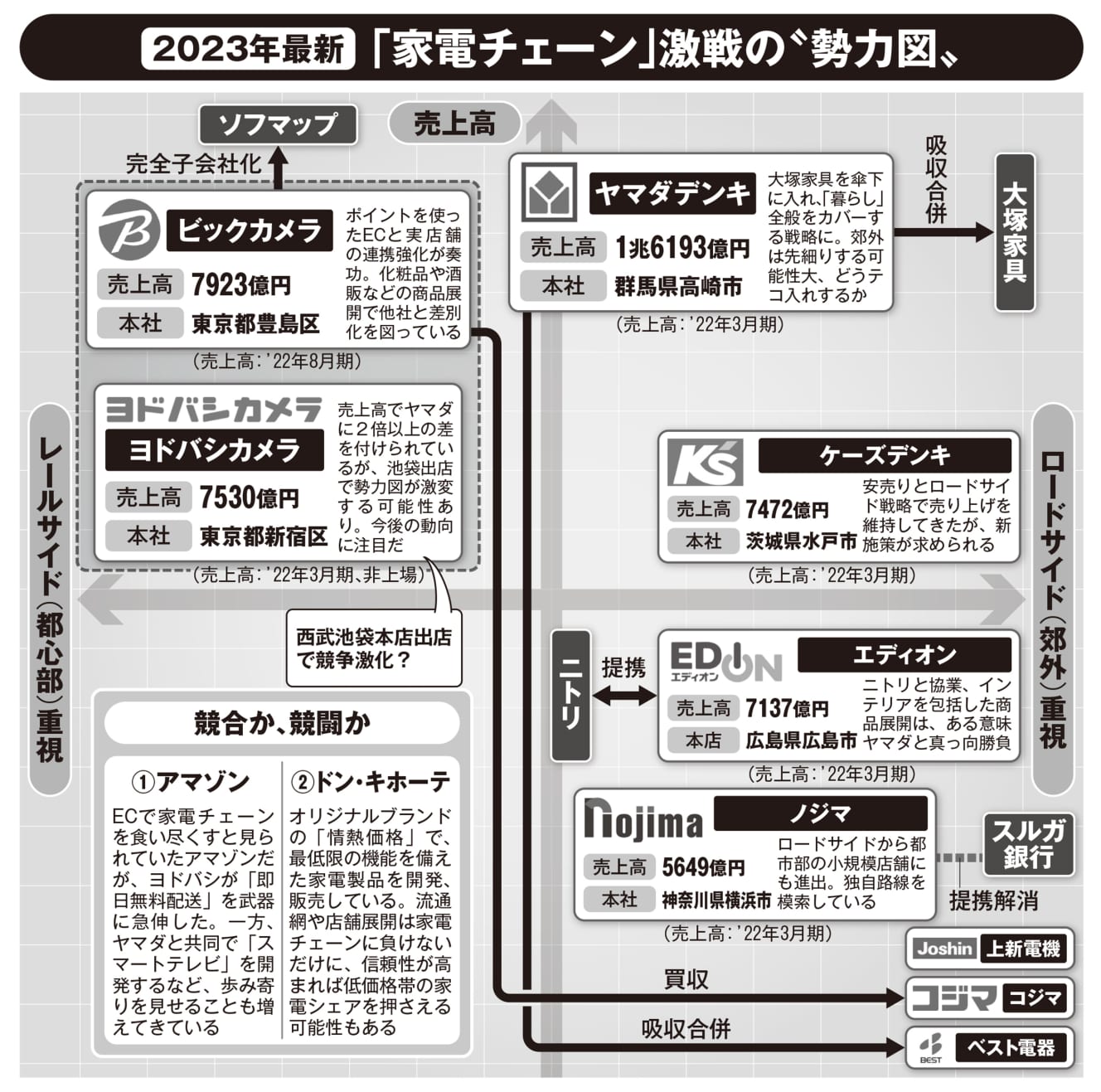Ikebukuro Becomes a Quake Zone for Mass Retail Chains of Consumer Electronics Stores! Report on the “YBYK War
Yodobashi Camera's "opening" of a store in the Seibu Ikebukuro flagship store will completely change the power structure.
The Day Yamada Falls to the Top
What about BIC, which wants to prevent Yodobashi from overtaking it at all costs?
BIC is focusing on the purchase and repair of used home appliances, based on the idea that the market will shift from the concept of buying one item after another to repairing and reusing products in an environmentally friendly manner. However, there are many specialized companies in this field, and it is unlikely to become a large market,” said Kazuyuki Suzuki, a stock analyst.
Rather, what seems promising is the resurgence of inbound sales. A person in the consumer electronics industry with knowledge of the Chinese situation said, “Chinese tourists are very interested in Big Sight.
A person in the home electronics industry with knowledge of the Chinese market says, “BIC is overwhelmingly popular among Chinese tourists. Recently, many tourists don’t buy home appliances, but cosmetics and medicines, and BIC has a full lineup of such products. Another secret to BIC’s popularity is the large number of knowledgeable Chinese shoppers.”
While the two companies are finding upside, Yamada, which is being chased, is likely to continue to face a difficult situation. Distribution analyst Hiroaki Watanabe says, “Yamada is a manufacturer in a deflationary environment.
Yamada has been able to increase sales by suppressing purchase prices and selling at low prices through competition among manufacturers in the face of deflation, but I sense that this model has reached its limits. With the population shrinking and the shift away from cars accelerating, fewer and fewer people should be visiting roadside stores.”
Closest to Yodobashi and BIC in terms of sales is K’s Denki, the fourth largest retailer in the industry. In the 1990s, when the number of home electronics retail stores increased rapidly, Yamada (Takasaki City, Gunma), Kojima (Utsunomiya City, Tochigi), and K’s (Mito City, Ibaraki) fought for supremacy in the northern Kanto region in what was known as the “YKK War. Along with Yamada, K’s Denki has maintained a firm share of the market.
K’s Denki operates at its own pace, pursuing a thoroughgoing roadside strategy and daring not to open stores in urban centers such as Ikebukuro. If the competition among the top four retailers for market share is called the “YBYK war,” what about the “K” strategy of going against the grain? Mr. Nakai, the aforementioned “K”, says, “K’s Denki is a huge company.
K’s Denki is a chain that has grown by opening stores in or near huge commercial facilities to increase the flow of people, but there are concerns about its future growth. One is that there is less and less room to open stores in favorable suburban locations. This is because other industries, such as apparel and restaurants, are also focusing on roadside strategies. Another is the use of “cash discounts” rather than points. BIC and Yodobashi have a strategy of accumulating points in stores and having customers spend them on e-commerce (mail order), but cash discounts do not allow for this.
Best Denki,” which once boasted the top sales position, was merged into Yamada, and Kojima, which had jumped to the top in 1997, was acquired by BIC in 2012. In an industry that is in a state of rapid rise and fall, there is a possibility that Yamada will fall from the top.
As a former Yamada employee noted above, stores in central Tokyo are cheaper due to the price-cutting competition and are located near train stations, making them easy to stop by on the way home from work. The stores’ intention is to increase the inflow of customers by encouraging them to compare their prices with those of other stores. The points granted to customers can be used to make purchases on the e-commerce site, thus retaining them in the store. The win-win relationship between the two sides is the reason why a “fierce battleground for consumer electronics” like Ikebukuro was created.
Meanwhile, Nojima is developing a strategy of “squeaking by” in the fierce battleground of Ikebukuro.
Nojima excels at small-scale development, such as on a single floor of a commercial building. Nojima is a small retailer that focuses on customer service and after-sales maintenance, and has discovered needs different from those of other retailers. I believe that Nojima will secure a position as an updated version of the ‘electronics store on the street,’ which has become rare in recent years.
Sooner or later, the power structure of the consumer electronics chains will completely change. The epicenter of this change will be Ikebukuro.


From the May 5, 2023 issue of FRIDAY
PHOTO: Takeshi Kinugawa
